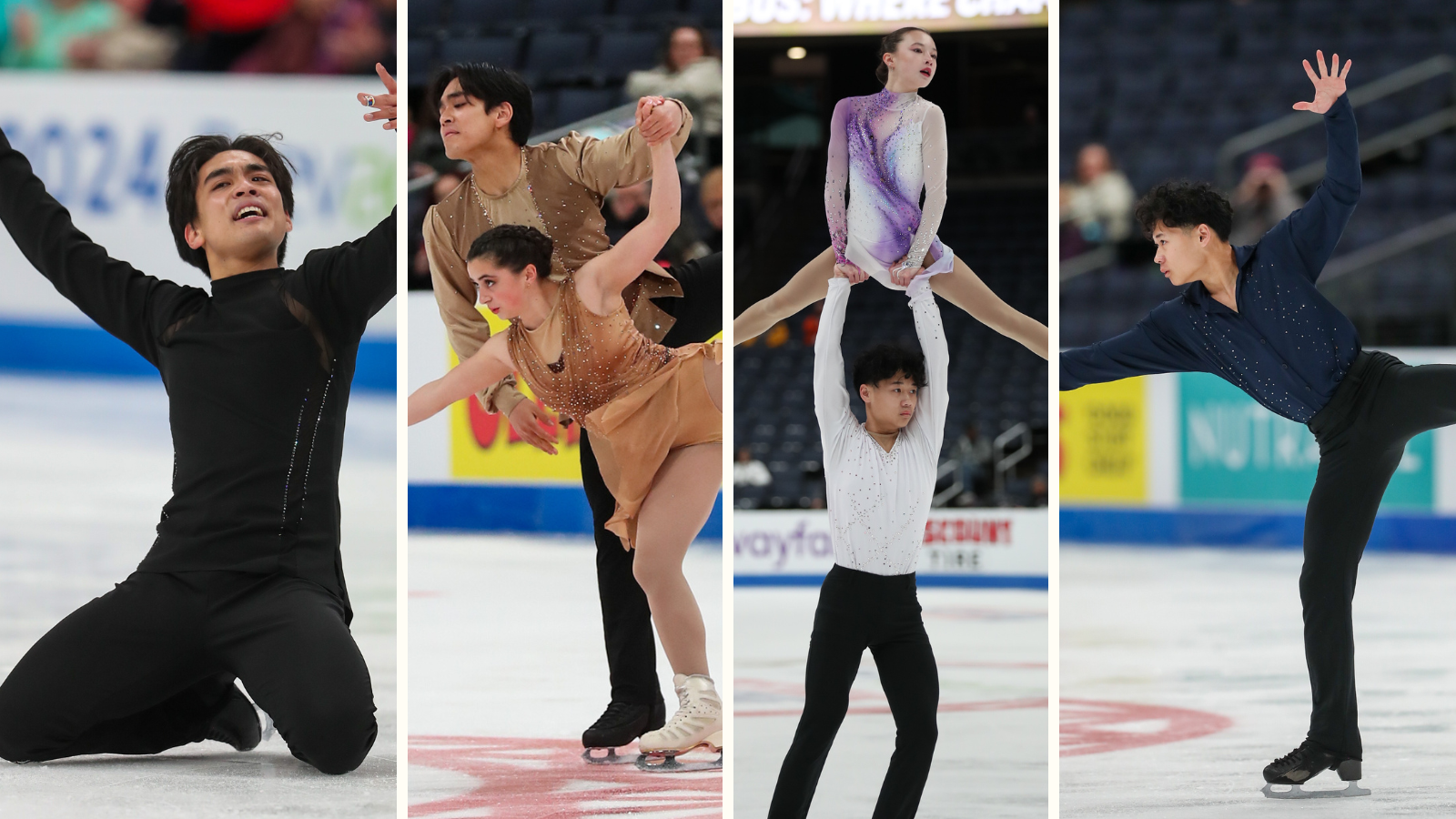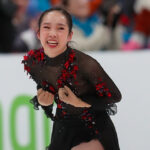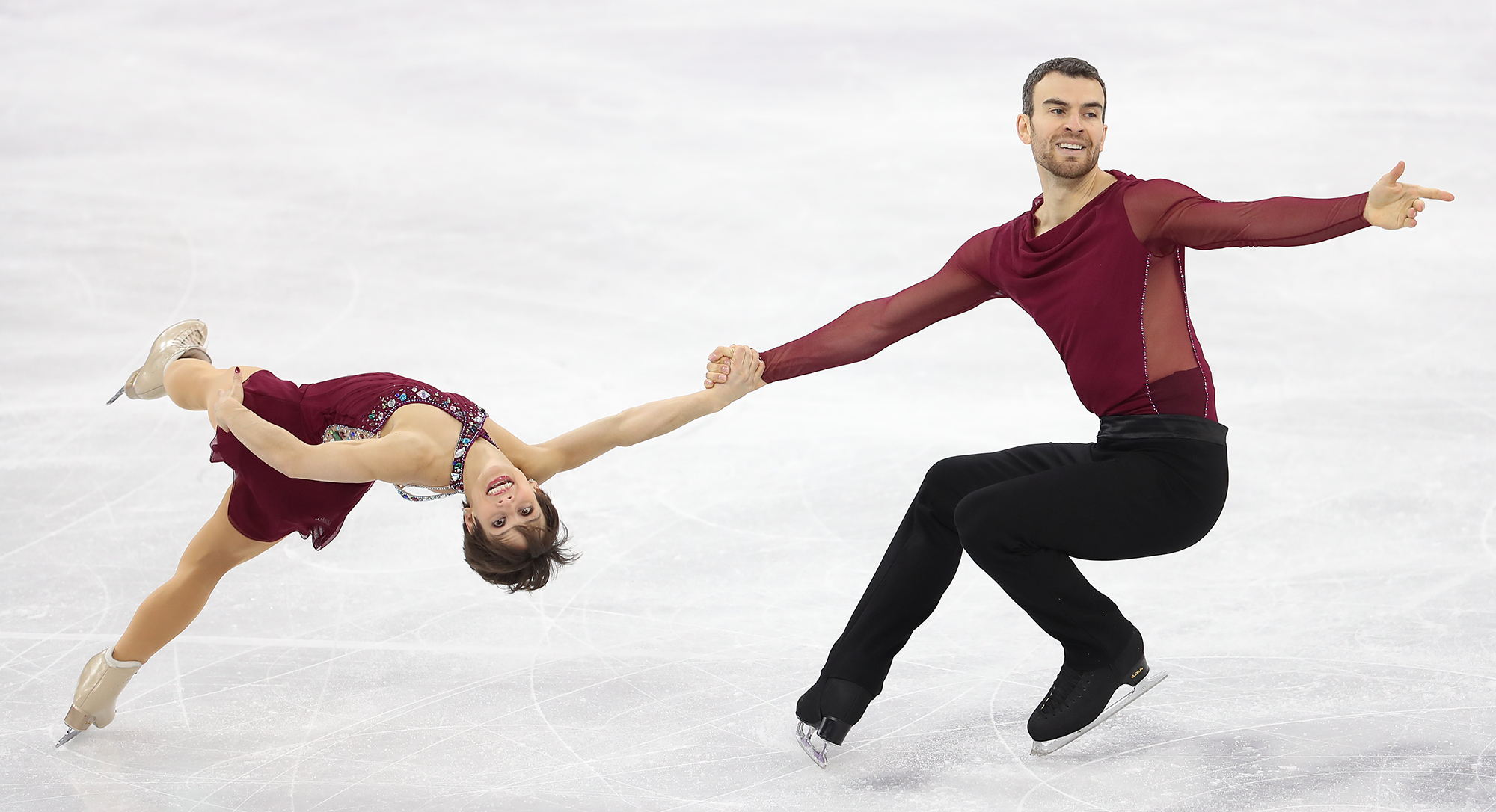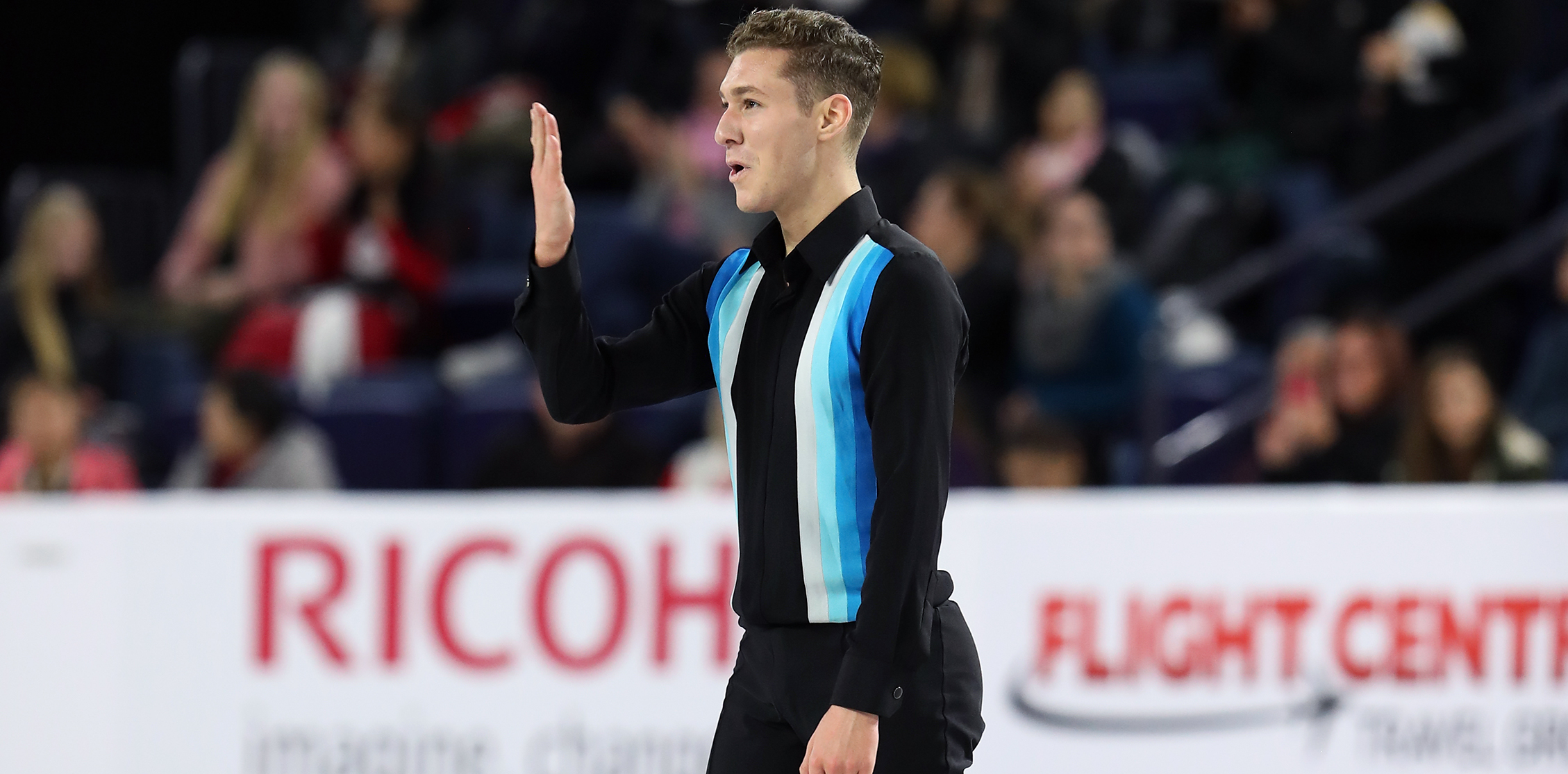By Maura Sullivan Hill, Team FSO contributing writer
Photos by Robin Ritoss
Luke Wang had just finished his junior pairs short program with partner Olivia Flores at the 2024 U.S. Championships, where they’d earned a U.S. personal best score. Standing in the mixed zone talking with reporters about the performance, Wang realized his next event was about to start.
That would be the junior men’s short program, because Wang qualified for the 2024 U.S. Championships in Columbus in both junior pairs and junior men. Wang and fellow junior pairs and junior men’s competitor Jon Maravilla were the only two skaters to qualify for Nationals in two events.
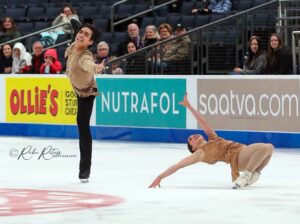 A favorite in the pairs event, Wang and his partner skated in the final group of that competition, and then Wang drew to skate in the first group in the men’s event. Which meant he had all of eight minutes to make it back onto the ice at Nationwide Arena.
A favorite in the pairs event, Wang and his partner skated in the final group of that competition, and then Wang drew to skate in the first group in the men’s event. Which meant he had all of eight minutes to make it back onto the ice at Nationwide Arena.
“I was still trying to absorb everything that I experienced just in that moment for the pairs, and I was still in the mixed zone. And Tammy [Gambill], one of the coaches, came up to me and was like, ‘Hey, your event is starting in less than 10 minutes.’ I think it was eight minutes,” Wang recalled in an interview after the competition. “I had to wrap it up and make a run for it. I was like, oh gosh, I gotta go. So I ran to the locker room right away, changed, I didn’t even get to put on a jacket. I just walked straight to the six-minute warmup.”
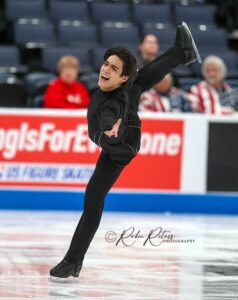 Wang said that he hadn’t expected to qualify for Nationals in the men’s event, and that he continues to compete in singles because of the joy and freedom he feels in performing. The same is true for Maravilla, who said pairs is his priority but that he still loves to compete in singles. The bottom line: These two athletes love to skate, and so they make it work to do both events.
Wang said that he hadn’t expected to qualify for Nationals in the men’s event, and that he continues to compete in singles because of the joy and freedom he feels in performing. The same is true for Maravilla, who said pairs is his priority but that he still loves to compete in singles. The bottom line: These two athletes love to skate, and so they make it work to do both events.
That doesn’t mean it is always easy. At Nationals, Wang ended up deciding to withdraw from the singles competition to focus on pairs. And Maravilla said his legs were exhausted by the end of the competition, where he performed four programs in two days.
Wang’s choice to prioritize pairs at this event paid off: He and Flores won the 2024 U.S. Junior title, and next week, they’ll compete at the 2024 Junior World Championships in Taipei City, Taiwan.
In the end, the competition schedule made it nearly impossible for Wang to compete in both events. On the day of the free skate, he and Flores had the 20-minute pairs warm up in the practice rink at 10:40 am. The junior men’s free skate, where he would skate in the first group, was scheduled to begin at 11:10 am in the arena. It would have been too hectic running from one rink to another, changing costumes and shifting gears from pairs to his individual free skate.
“Mentally, I think it is hard to be able to do both, because it’s just very different packaging, very different elements, very different performances,” Wang said. “Mentally, in pairs, you have to skate with someone and you have to complement them and coordinate and be able to communicate and have that fuel the performance. In singles, you can only rely on yourself; you have to be in control of yourself and how you go about doing the program, one element at a time. It is very different then when you’re able to work together. It’s very difficult mentally to be able to change very fast to go from pairs to singles.”
Wang said that adrenaline helped him switch gears in the short programs, where he went from skating to the Broadway version of “Anastasia” in the pairs short to a tango in the men’s event.
It’s n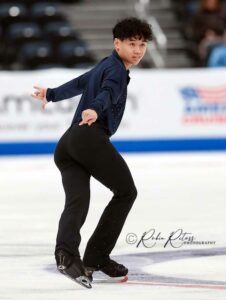 ot entirely uncommon for skaters to compete in multiple disciplines early in their careers. Most skaters start out in singles and then will explore pairs, ice dance, solo dance or synchronized skating. Wang and Maravilla stand out in that they qualified for Nationals in two disciplines – they are excelling at the highest level in both.
ot entirely uncommon for skaters to compete in multiple disciplines early in their careers. Most skaters start out in singles and then will explore pairs, ice dance, solo dance or synchronized skating. Wang and Maravilla stand out in that they qualified for Nationals in two disciplines – they are excelling at the highest level in both.
Maravilla was able to finish the competition in both events because of a slightly different skating order. He competed in the second group of men in the free skate, so he had more time between the pairs 20-minute warm up and his individual competition.
Maravilla and his partner Saya Carpenter finished in fifth place in pairs, and he landed in 13th in the men’s event. He earned U.S. personal best scores in both short programs in the competition.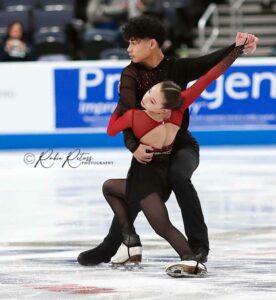
Maravilla said that nothing can prepare you for the adrenaline of skating four programs over two days, but he would simulate that competition schedule in training, doing run-throughs of both short programs on the same day followed by both long programs the next day. He had also competed in both events at competitions throughout the season.
Between events at the competitions, Maravilla made sure to rest and reset. At Nationals, he went back to where he was staying and got reenergized by relaxing on the couch, he said. When he took the ice for his final program in the pairs free skate, it was with renewed energy and gratitude.
Maravilla was thinking, “Wow, this is really my fourth time I’ve stepped out on this ice. Looking up at the arena, it just kind of brought a smile to my face and I was like, wow, I really got through it.”
When it comes to balancing training for both events, both Wang and Maravilla say they start the day with their pairs training. Wang trains with Drew Meekins, Natalia Mishkutenok and Danny O’Shea in Colorado Springs, and Maravilla is at the Detroit Skating Club with Yuka Sato and Steve Hartsell.
Maravilla said that building strength was essential to the process. When his coaches first suggested he try pairs, he was skeptical.
“I was like, I’m not big, I’m not strong, I can’t do pairs,” Maravilla said. “But they kept asking and asking, and I was like, ‘Okay, I’ll give it a shot.’ And it was pretty fun, I enjoyed it.
“Timewise, it took me a while to get used to training both, especially for my body to build up the strength. It took several months to get my body feeling capable of really training both to a high capacity. It got easier the harder I worked. The next day was easier, so it was just pushing through every day, because that’s how you get through it, really taking it day by day.”
Maravilla said he enjoys the variety in pairs, compared to singles.
“Singles is jumps, jumps, jumps, and then you’ll have a spin in there. But with pairs, you have such a good variety of elements where, if your jumps aren’t feeling good that day, well, you still have five or six different elements that you can do. I really enjoy that part, the variety it gives.”
Both Maravilla and Wang see a window of opportunity in pairs skating, which is why they are putting their main focus and efforts into that discipline. They cited the inspiration of watching fellow U.S. skaters Alexa Knierim and Brandon Frazier win the World Championships in 2022. Both in the U.S. and internationally, pairs seems to be in a rebuilding phase. A number of teams, like Knierim and Frazier and the 2022 Olympic Champions from China, Wenjing Sui and Cong Han, are on extended breaks without official retirement announcements. Others, like Canadian competitors Kirsten Moore-Towers and Michael Marinaro and Vanessa James and Eric Radford, have officially left the competitive ranks. Plus, Russia is still banned from international competition indefinitely due to the war in Ukraine, and they are traditionally dominant in the pairs field, so there is a void. There are opportunities for success, and medals, that American skaters are hoping to take advantage of.
And as both of these skaters look to their own futures with big goals, Wang, in particular, is inspired by a star of the past who juggled two disciplines like he and Maravilla have: 1992 Olympic Champion Kristi Yamaguchi, who famously skated pairs with Rudy Galindo and won two senior national titles with him before choosing to focus on singles.
“I started appreciating pairs more not too long ago, watching the 2018 Olympics. When I started [skating] pairs and learning and watching more, I learned that Kristi Yamaguchi did both in her time, both at an elite level, which is just incredible. She was always an inspiration of mine, and then to find out she did pairs, too, it was incredible,” Wang said. “And [Jon], who did both here, too, it is a testament to your mental strength, not just physical, and your real passion for wanting to do both. And the grit you need to do both.”


